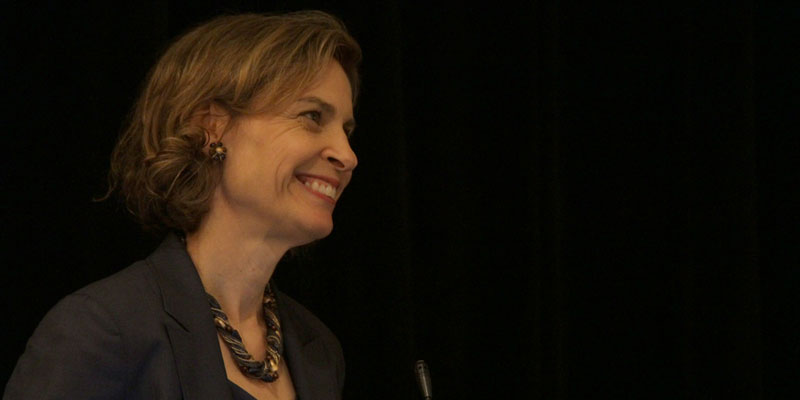Susan Crawford says she has rarely been more embarrassed than when, on her most recent visit to Seoul, Koreans told her that they enjoyed visiting the United States because it felt like a rural holiday in a Third World country. Slow-paced, peaceful, and disconnected from modern life.
They felt this way even though they had visited the largest American cities. Sadly, Crawford said, the United States falls in the middle of the pack when it comes to internet infrastructure and access – and at the bottom in terms of what consumers get compared to what they pay for.
“We treat internet access as a luxury and not as a utility,” Crawford said. “This is one of our most important social issues because of its impact on educational outcomes, on reduction of inequality, on new jobs and productivity.”
Crawford, co-director of the Berkman Center for Internet and Society at Harvard, and a professor at Harvard Law School, spoke Thursday, Oct. 22, at the Knight School of Communication at Queens. In a visit sponsored by the Knight Foundation, Crawford discussed the non-competitive nature of internet access and infrastructure in the United States and its impact on education, economic development, medicine, government, and other components of civic life.
Eighty percent of Americans have only one choice for high-speed internet access, she said. In some cities – Charlotte included – the arrival of Google Fiber is leading to improvements in offerings by incumbent cable television and telecommunication companies. But Google is not interested in rolling out fiber optic infrastructure to every city in the United States, Crawford said — nor would we want the company to do so.
The current state of internet access is simply a question of policy, Crawford said in an interview with WFAE-FM shortly before her lecture.
“This is happening because of things that occurred in Washington beginning in 2003 and 2004,” Crawford said. “We deregulated all of high-speed internet access and made it a luxury product, essentially, just like a top-end restaurant. Only recently, in the last 12 months, the Federal Communications Communication has moved back towards classifying high-speed internet access as a utility, and has begun looking at state laws that are blocking cities from making the choice to install fiber for themselves, as Wilson and Salisbury did [in North Carolina], and is starting to treat this as basic infrastructure, just like roads and airports.
“The exact same thing happened with electricity,” Crawford told Mike Collins of “Charlotte Talks” on WFAE. “That was subject to a series of very tightly held cartels in America until FDR took it on, and said, ‘no, every American needs to have inexpensive electricity,’ and not only funded the rural electric cooperative, but also regulated the electricity industry.”
Crawford’s visit comes at a critical time in Charlotte’s development, said Eric Freedman, dean of the Knight School, as the city works toward a policy of digital literacy and inclusion that reaches, educates, and engages all area residents. A Digital Inclusion Steering Team now leads this effort, including representatives from the City of Charlotte, Mecklenburg County, Charlotte Mecklenburg Schools, Charlotte Mecklenburg Library, the John S. and James L. Knight Foundation, the Knight School of Communication at Queens, the Urban League of Central Carolinas, Goodwill Industries of the Southern Piedmont, the Media Democracy Fund and Charlotte Hearts Gigabit.
